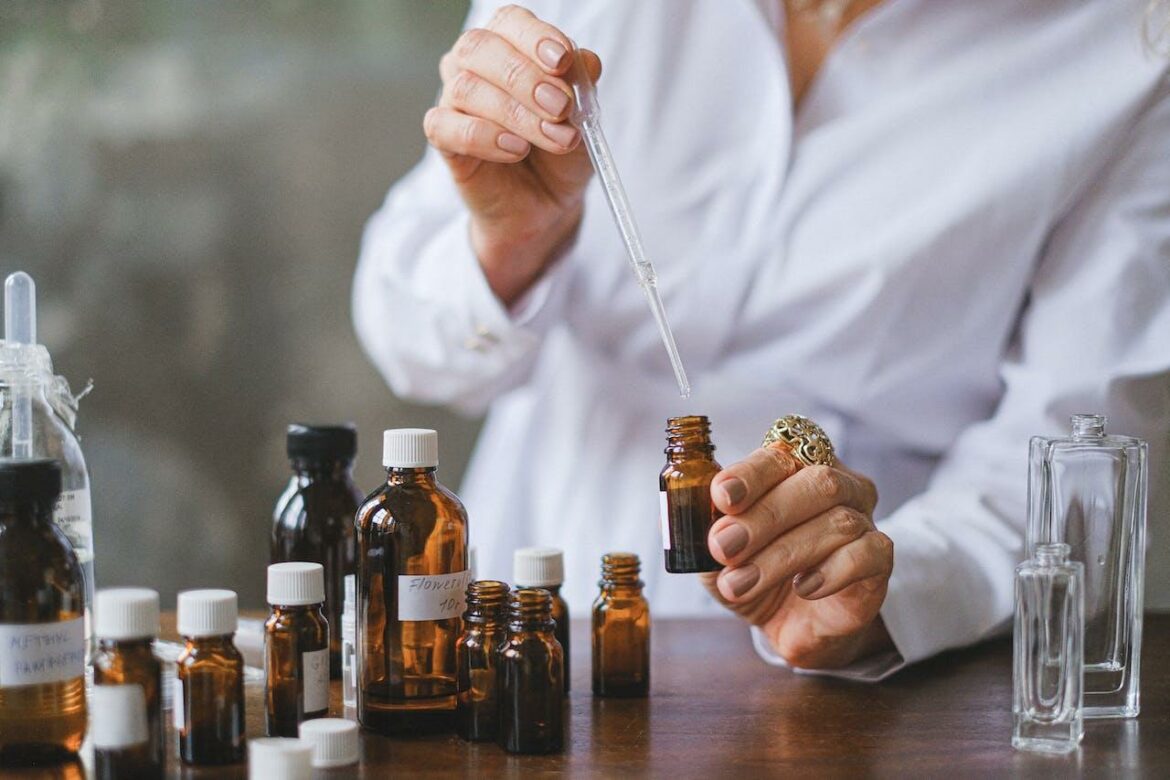The Beginner’s Guide to Essential Oils: Getting Started
So, you have heard whispers about the wonders of essential oils, and now you are thinking, “What’s all the fuss about?” Whether you are a seasoned aromatherapy guru or a total newbie, this blog will cover all the basics of essential oils, including the what, when, how, and why.
Let’s start from the beginning, shall we? Essential oils are like nature’s little miracles bottled up. Extracted from plants, flowers, and herbs, these oils pack a punch of concentrated goodness that can elevate your physical and mental well-being. And the best part? They smell absolutely divine.
Before you start slathering oils all over the place, it’s essential (see what we did there?) to do a bit of research. Each oil has its own properties and benefits, so take some time to understand what you are working with. The possibilities are endless: lavender for relaxation, tea tree for glowing, acne-free skin, peppermint for a pick-me-up!
What Are Essential Oils?
Essential oils are concentrated liquids containing volatile aroma compounds from plants. They are extracted through methods like steam distillation or cold pressing, capturing the plant’s fragrance, flavor, and therapeutic properties. Essential oils have been used for centuries to promote physical and emotional health.
When Were Essential Oils First Discovered
According to a study published in the Journal of BioMed Research International on The Biological Effects of Some Mediterranean Essential Oils on Human Health, aromatic oils were integral to traditional Indian and Chinese medicine. They were first used between 3000 and 2000 BC in Ayurveda and Traditional Chinese Medicine (TCM) for their therapeutic benefits.
History records around 700 substances, including sandalwood, myrrh, cinnamon, and ginger, as being the most effective for healing. Ancient Egyptians also used aromatic oils in ointments and cosmetics in 4500 BC. Lastly, Greek history documents essential oils being used between 500 and 400 BC. These include peppermint, cumin, saffron, marjoram, and thyme.
In the modern world, French chemist René-Maurice Gattefossé highlighted the benefits of essential oils. In 1910, Gattefossé suffered severe burns on his hands after a laboratory explosion. Desperate to find a solution for his wounds, he turned to lavender essential oil. Surprisingly, he observed that the burns healed more rapidly and with less scarring than expected. This incident marked a turning point in his career, prompting him to delve deeper into the therapeutic properties of essential oils.
Gattefossé’s groundbreaking work culminated in the publication of his book “Aromathérapie: Les Huiles Essentielles, Hormones Végétales” (Aromatherapy: Essential Oils, Plant Hormones) in 1937. This seminal work laid the foundation for the modern practice of aromatherapy and introduced the term “aromatherapy” to the world.
How Are Essential Oils Used

Let’s explore three common ways essential oils are used:
The Allure of Aromatherapy
Ah, aromatherapy – the buzzword that’s been wafting around a lot lately. But what’s the hype all about? Aromatherapy is the art and science of using essential oils for cosmetic and healing purposes. It basically offers a spa day for your senses! Inhaling the aroma of these oils can influence your mood, reduce stress, and even promote better sleep. Imagine turning your home into a Zen den with just a few drops of your favorite essential oil.
One of the coolest things about essential oils is their versatility. You can unleash your inner alchemist and create your own potions! From DIY room sprays to homemade skincare products, nothing is off the table. Just a heads up – once you start experimenting, there’s no turning back. You might find yourself concocting all sorts of aromatic blends for every corner of your life.
Here’s how aromatherapy works:
- Diffusers: Using an essential oil diffuser is a popular method. The diffuser disperses the oil into the air, creating an aroma that you breathe in. This method is effective for creating a relaxing or uplifting atmosphere.
- Steam Inhalation: If you don’t have a diffuser, you can go old school and add a few drops of essential oil to hot water. Inhaling the steam is another way to benefit from aromatherapy. This method is commonly used to alleviate respiratory issues or sinus congestion.
- Sprays and Mists: Essential oils even come in spray and mist forms to freshen up a room, linens, and yourself.
Ingesting
When mixed responsibly, some essential oils can be taken internally, opening up a whole new world of aromatic adventures.
- Culinary Exploration: A drop of lemon oil in your water or a hint of basil oil in your pasta sauce can elevate your beverage or dish’s taste. Remember, though, quality matters – ensure your oils are labeled as safe for internal use.
Topically
Applying essential oils directly to the skin is another common method, but measuring your drops is essential to avoid irritation. Here’s how essential oils can be used topically:
- Massage: Mix a carrier oil with one or more essential oils (a few options include jojoba and coconut oil) to create a massage oil. You can apply this on the skin for a massage to promote relaxation.
- Baths: Adding a few drops of essential oil to a warm bath is a luxurious way to enjoy their benefits. Not only does it create a pleasant aroma, but the oils can also be absorbed through the skin, providing a holistic experience.
Caution: Handle with Care
These little powerhouses are potent, and a little goes a long way. Always dilute essential oils before applying them to your skin, and if you are pregnant or have any health concerns, it’s wise to consult with the plant experts (aka healthcare professionals) first.
What is a Carrier Oil?

As mentioned earlier, essential oils are potent, and using them directly on your skin can be harmful. This is where carrier oil comes in. Carrier oils, aka vegetable or base oils, are plant-derived oils used to dilute essential oils and carry their concentrated properties. These oils are generally extracted from plants’ seeds, nuts, or kernels.
They work as a foundation in the mixture, adding moisture and ensuring the essential oils don’t go rogue on your skin.
Not all carrier oils are created equal. They each bring their own set of superpowers to the table. Take coconut oil, for instance – it hydrates the skin, and its smell makes you feel like you are in a tropical paradise. There’s jojoba oil, which closely resembles the skin’s natural oils, keeping everything in harmony.
Dos and Don’t of Using Essential Oils
The Dos
Do Dilute the Oil
One of the golden rules of using essential oils is dilution. Undiluted essential oils are harsh on the skin and might cause irritation, so adding carrier oils is necessary. This not only ensures safety but also helps in better absorption.
Do Inhale it Mindfully
Inhaling essential oils can do wonders for your mood and overall health, but moderation is key. A couple of drops in a diffuser or a bowl of hot water is plenty. Don’t go overboard and create a fog that rivals London in the 19th century – your lungs will thank you.
Do Conduct a Patch Test
Your skin depends on it!
Apply a diluted mixture to a small area of your skin and wait for 24 hours. You are good to go if there’s no irritation, redness, or itching. Everyone’s skin is different, so what works for your friend might not work for you.
Do Prefer Quality Over Quantity
Invest in high-quality essential oils. Sure, you might find a cheap knockoff at the corner store, but these often contain synthetic fragrances and might not provide the therapeutic benefits you seek. Go for oils that are pure, organic, and sourced responsibly.
Do Store Them Safely
Air, heat, and light can degrade the quality of essential oils. Store them in dark glass bottles, shield them from direct sunlight, and keep them in a dark, cool place.
Do Read About Essential Oils
Knowledge is power, especially when it comes to essential oils. Different oils have different properties, and some might not play well together. Educate yourself on the oils you have, their benefits, and any potential contraindications. Knowing what you are working with can prevent accidents and enhance your experience.
Bonus Do: Your body knows best. If you experience any adverse reactions, listen to what it’s telling you. It might be a sign to switch up your oils or dilution ratios.
The Don’ts
Don’t Go in the Sun After Using Citrus Oils
Citrus oils such as bergamot and lemon make your skin more sensitive to sunlight. If you use these oils on your skin, refrain from going outside for at least 12 hours. A sunburn is not the aromatic experience you signed up for.
Don’t Use During Pregnancy Without Guidance
Pregnancy is a delicate time, and not all essential oils are safe during this period. Some oils can stimulate contractions or cause other complications. If you are expecting, seek advice from a healthcare professional before using essential oils.
Don’t Let Your Pets Get into Your Essential Oils Stash
Essential oils might not be as friendly to your furry friends as they are to you. Keep direct contact with pets to a minimum, as their livers metabolize substances differently than ours. Certain oils like tea tree and eucalyptus can be harmful to them.
Don’t Drink Them
Essential oils are potent concentrates, and ingesting them without proper knowledge and guidance can be risky. Don’t treat them like your morning coffee. Consult a qualified aromatherapist if you are interested in internal use.
Don’t Use It in the Eyes
Your eyes are sensitive, and essential oils are not meant to be used in the eyes. If you accidentally get some in your eyes, flush them immediately with carrier oil or milk, not water. Water and oil don’t mix, and you might intensify the discomfort.
Don’t Add Too Much to the Diffuser
We get it; the scent is intoxicating, but resist the urge to drench your diffuser in essential oils. A few drops are usually sufficient. More doesn’t necessarily mean a better experience. Overdoing it can lead to headaches and respiratory issues.
Top 10 Benefits of Essential Oils

Mood Enhancer
Feeling a bit blue? Essential oils, including citrus oils such as orange and grapefruit, are natural mood enhancers, promoting positivity and happiness. Diffuse these oils, and watch the clouds lift from your mental landscape.
Stress Buster
Life can get crazy, and stress often takes center stage. Scents such as lavender, chamomile, and frankincense have magical properties that can soothe your nerves and transport you to a serene oasis.
Mind Sharpener
Need a mental boost for that looming deadline? Essential oils can help sharpen your focus and enhance cognitive function. Rosemary, peppermint, and basil oils are known for their brain-boosting capabilities. Inhale, exhale, and let the mental clarity flow.
Sweet Lullaby
Kiss those sleepless nights goodbye with the help of essential oils. Lavender, cedarwood, and bergamot are your ticket to the land of dreams. Simply add a few drops to your pillow, and voilà – a good night’s sleep awaits.
Natural Energizer
The 3 P.M. slump makes you procrastinate. At this hour, you question your life choices. Instead of drowning in misery, use peppermint, citrus, or eucalyptus oil to give yourself a natural energy boost. It will leave you feeling refreshed and ready to conquer the day.
Skin Savior
Who needs a complicated skincare routine when you have essential oils? Tea tree oil tackles blemishes, lavender promotes healing, and rosehip oil makes your skin radiant.
Immunity Booster
A robust immune system is your best defense in a world of germs. Add a few drops of essential oils like tea tree, eucalyptus, and lemon to your diffuser to create a germ-fighting fortress in your bedroom and living room.
No More Headaches
The cooling effect of peppermint oil inhibits muscle contractions that cause headaches. Dab a bit on your temples, and let the soothing commence.
Bug Repellent
Summer evenings on the patio can quickly turn into a battle with mosquitoes. Before you reach for the chemical-laden bug spray, consider the natural alternatives. Citronella, lavender, and eucalyptus oils are potent bug repellents, keeping those pesky critters at bay.
Pain Relief Partner
For those nagging aches and pains, essential oils offer a holistic approach to relief. Eucalyptus, ginger, and chamomile oils have anti-inflammatory properties that work wonders on sore muscles and joints.
Final Word
As we wrap up this exploration, it’s worth mentioning once again the importance of choosing high-quality essential oils from reputable sources. The sourcing and purity of the oils can greatly impact their effectiveness, so investing in quality products ensures that you are reaping the full benefits of these potent plant extracts.
Whether you choose to diffuse essential oils, create your blends, or incorporate them into your skincare routine, do so with care and guidance from an expert. The aromatic and therapeutic benefits of essential oils make them a wonderful tool for enhancing your overall well-being, but use them wrong, and you might end up with a few side effects… nothing serious, though.
Step into a world where nature’s finest essences are bottled just for you. Maverick Oils offers a collection of essential oils for enhancing your physical, emotional, and mental well-being. Each drop is a concentrated burst of nature, meticulously extracted to bring you the purest form of these botanical wonders.
For product price requests and specification sheets, visit our website for a quote. For more information, call +1 (888) 516-8881.


